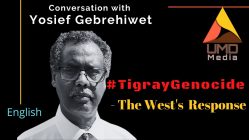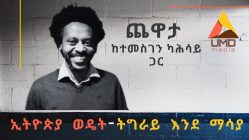Major General Teklebrhan W/Aregay (PhD)
August 4, 2024
Tigray is currently grappling with an unprecedented crisis characterized by uncertainty, volatility, and complexity. This brief aims to outline the criteria for selecting leadership capable of guiding Tigray out of this quagmire. Rather than focusing on a single, strong leader, the emphasis is on building a collective leadership core that prioritizes the needs of the Tigrayan people.
The traditional leadership model in Tigray has proven ineffective in addressing the nation’s complex challenges. It is imperative to shift towards a new paradigm that emphasizes inclusivity, human dignity, and the rule of law. To achieve this, a clear set of criteria must be established to identify potential leaders and build a strong support base.
To navigate Tigray out of its current crisis, leaders must demonstrate a commitment to the following principles.
1) Creating an enabling space
Effective leadership in Tigray requires cultivating an environment where individuals can freely think, feel, decide, and act in the public interest without fear of judgment, blame, or coercion. This enabling space necessitates a clear break from the past, respect for individual dignity, a commitment to human values, aspirational leadership, a strong foundation in the rule of law, psychological safety, and Peace as a Foundation.
- Breaking free from the past
To establish a foundation for progress, Tigray must dismantle its legacy of repression. The political landscape has been poisoned by a pervasive culture of propaganda, disinformation, defamation, intimidation, and blackmail, stifling open dialogue and critical thinking. To create a space for genuine growth, leaders must be unequivocally committed to rejecting these harmful practices and embracing transparency and truth. Any potential leader or group must demonstrate a strong resolve to transcend these old habits and usher in a new era of open dialogue and cooperation.
- Respect for individual dignity
Every Tigrayan is a vital component of the larger Tigrayan community. We, the Tigrayans (ተጋሩ), yearn for human dignity, recognition, respect, and an equal voice in determining our collective future. Leaders who acknowledge and uphold the principle of individual Tigrayans as equals to the broader Tigrayan community are essential for building a just and equitable society.
- Commitment to human values
Tigray yearns for leaders who embody compassion, empathy, and understanding. A leadership that prioritizes human connection over divisive rhetoric is essential for fostering unity and healing. The region has suffered greatly under the weight of dehumanizing ideologies and divisive slogans like “መስመርና” (mesmerna) and pretentious propaganda around “ህዝቢ” (hizbi). To rebuild trust and create a harmonious society, humanity must be at the core of Tigray’s leadership.
- Aspirational leadership
Effective leadership in Tigray requires individuals with a clear vision for the nation’s future. These leaders must be driven by a strong desire for positive social change and nation-building. While ideological differences may exist, the unifying factor should be a shared commitment to lifting Tigray out of its current crisis.
- Upholding the rule of law
Tigray’s current crisis is exacerbated by a severe absence of the rule of law. This fundamental principle is essential for creating a stable and just society. Potential leaders must demonstrate a strong commitment to establishing a legal framework that upholds the rights of all citizens and ensures accountability for those who violate the law.
- Psychological safety
Psychological safety is paramount for the rebuilding of Tigray and the fostering of a united community. This environment must cultivate self-awareness, mental well-being, and a shared sense of purpose. Without a foundation of psychological safety, hope and aspiration for the future will remain elusive.
- Peace as a foundation
Peace is indispensable for progress in Tigray. It is the essential resource for creating an environment conducive to development and reconciliation. A commitment to peaceful solutions is therefore a fundamental quality in any leader seeking to guide the region towards a brighter future.
2) Delivering essential public services
The devastating three-year conflict has left Tigray in a state of crisis, with essential public services virtually non-existent. The region is grappling with a dire need for justice, security, education, and healthcare. The absence of these services has created a precarious situation, exacerbated by issues such as land grabbing, illegal mining, human trafficking, and rising crimes. To prevent a return to a feudal system, it is imperative to establish competent and meritocratic institutions capable of delivering essential public services and restoring order to the region.
Creating an enabling environment and delivering public services are mutually reinforcing objectives. Effective leadership requires both the establishment of a conducive atmosphere for growth and development, as well as the implementation of practical solutions to address the region’s immediate needs.
Editor’s Note: The opinions expressed in the articles published on UMD Media are solely those of the individual authors and do not necessarily reflect the views or opinions of the editorial team or UMD Media as an organization. The publication of any opinion piece does not imply endorsement or agreement by UMD Media. Readers are encouraged to critically evaluate the content and form their own conclusions. Leave your comments below. Send us your thoughts and reflections to umd.media.2020 at gmail dot com.
Guidelines for contributors All contributions and comments submitted to UMD Media must adhere to the following guidelines. Respectful Language: Avoid using ethnic adjectives that generalize or portray an entire ethnic group in a negative light. Such language is harmful, divisive, and contrary to our commitment to fostering a respectful and inclusive environment. No Incitement: Content that incites hatred, violence, or discrimination against any individual or group based on ethnicity, race, religion, etc will not be tolerated. Constructive Dialogue: We encourage constructive dialogue and the sharing of diverse perspectives. However, it is essential to express opinions in a manner that respects the dignity and humanity of all individuals and groups. Moderation and Enforcement: Our editorial team reserves the right to moderate and, if necessary, remove any content that violates these guidelines. Repeat offenders may be subject to account suspension or banning. By contributing to our platform, you agree to abide by these guidelines and help us maintain a respectful and inclusive community.
Subscribe to UMD Media channel. Join UMD Media Telegram Channel: https://t.me/UMDMedia



